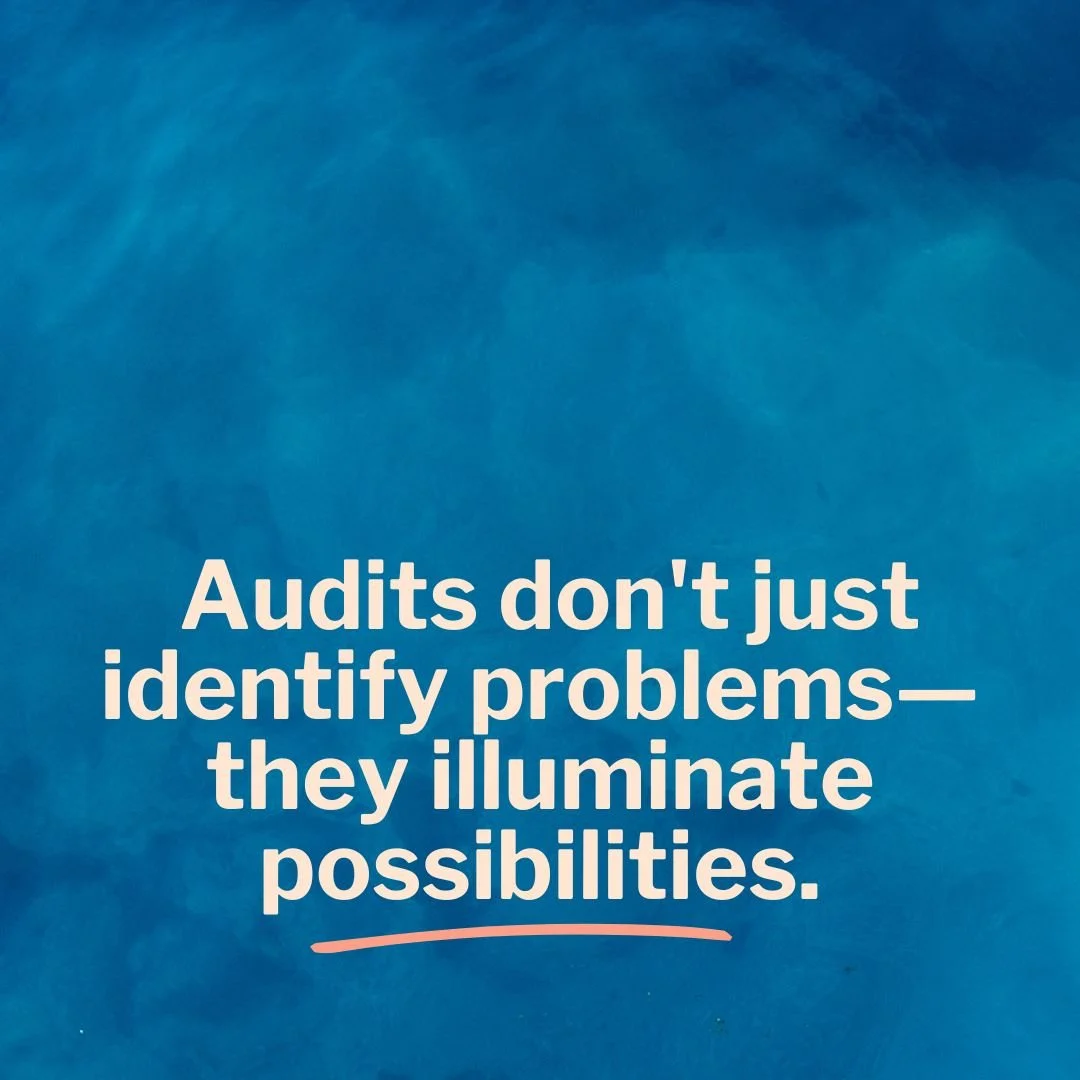Why My Work Always Starts with an Audit
Audit: From Questions to Opportunities
Yuck.
The word "audit" can incite fear—I think because what comes to mind are financial audits where we discover what went wrong, where we cheated, highlighting all our mistakes. But that's not how I think about or conduct audits for brands.
I see an audit as a thoughtful conversation between curiosity and discovery. Rather than an interrogation, it's an exploration guided by genuine interest in understanding what makes a business work—and what might help it work better.
I start with questions that matter. About the website, about the brand messaging, about the customer experience. These aren't gotcha questions designed to expose failures, but sincere inquiries that lead to three fundamental insights:
What's Working
What's Broken or Missing
What Experiments Can We Try Next
That's not scary. That's strategic.
The process feels less like judgment and more like detective work—except we're solving the mystery of untapped potential rather than uncovering crimes. I gather data not to build a case against current practices, but to understand the story your business is actually telling versus the story you want to tell.
When clients and I discuss findings, something interesting happens. Sometimes they have thoughtful reasons for choices that initially seemed puzzling. Sometimes they simply didn't know there was a better way. And often, they've wanted to make changes but weren't sure where to start or how to prioritize.
This collaborative approach transforms what could feel like criticism into partnership. The audit becomes a foundation for genuine improvement rather than a list of everything that's wrong.
From this process emerges something invaluable: a streamlined list of priorities with clear, actionable recommendations. Not overwhelming theory, but practical next steps that feel achievable.
The feedback I receive consistently surprises clients themselves. After a recent audit, my client shared:
"That was eye-opening for me, so thank you. None of this was overwhelming at all. It was basically exactly what I thought, in terms of you knew what to look for. The problem with me is I just wouldn't have known—I don't even know what's correct, so I wouldn't have known what was incorrect. It all seems really, really do-able also."
This response captures something essential about effective business analysis: it should illuminate rather than intimidate, clarify rather than confuse. When done with genuine care and expertise, an audit doesn't expose inadequacy—it reveals possibility.
The best audits don't just identify problems—they illuminate possibilities. The most meaningful discoveries often aren't about what's broken, but about recognizing strengths that weren't being fully leveraged or opportunities that were hiding in plain sight. It's about seeing the business through fresh eyes while honoring the vision and effort that brought it this far.
My eCommerce Audit Process
For eCommerce stores specifically, this philosophy translates into a structured yet flexible approach that honors both data and intuition.
Discovery Call: We begin with honest conversation about the challenges keeping you awake at night. Usually these center around sales plateaus, underperforming ads, disappointing conversion rates, or other KPI metrics that aren't meeting expectations. This isn't about assigning blame—it's about understanding where the gaps between intention and reality might be hiding.
The Audit Phase: Once we book the audit, I ask for access to your digital ecosystem—Klaviyo, ad accounts, Google Search Console, Google Analytics, your Shopify site, Meta Ads, Google Ads, Merchant Center. This comprehensive view takes 2-3 weeks to analyze thoughtfully. I'm not just collecting data; I'm listening to what your business is trying to tell us through the numbers.
Findings Presentation: We spend 90 minutes together reviewing discoveries and recommendations. This isn't a one-way presentation—it's a collaborative conversation where data meets strategy and your business knowledge fills in the context that numbers alone can't provide.
Implementation Planning: Finally, we define what will be implemented and by whom. Sometimes it's your internal team, sometimes external experts, sometimes a collaboration with me. The goal isn't to create dependency, but to build capability and momentum that serves your business long after our formal engagement ends.
This process respects both the complexity of eCommerce and the reality that sustainable growth comes from understanding, not quick fixes.
Are you ready for an audit of your business?
Not the fear-inducing kind, but the kind that opens doors to what could be.
Learn more here, or contact me to book an intro call.

